by Rev. Fr. Thomas Fitzgerald
The life of the Orthodox Church perpetuates and fulfills the ministry of Jesus Christ. The close association between Christ and His Church is reflected in the images from the Scriptures which declare that Christ is the Head and the Church is His Body; and that Christ is the Bridegroom and the Church is His bride. These images express the reality that the Church does not exist independently from Christ.
The Lord and Savior, who was known, loved, and followed by the first disciples in Galilee nearly two thousand years ago, is the same Lord and Savior who is known, loved, and followed through His Church. As Christ revealed the Holy Trinity, His Church continues to reveal the Holy Trinity and to praise God in her worship. As Christ reconciled humanity to the Father, His Church continues to be the medium of reconciliation by word and action throughout the world. As Christ manifested the vocation of authentic human life, His Church continues to be the realm through which the image and likeness of God in each of us is brought to perfection.
The Orthodox Christian becomes united with Christ at Baptism and is nurtured by Christ at every Eucharist. We believe that the Holy Spirit acts in and through the Church to make Christ our Lord and to bring His work to fulfillment.
Orthodoxy has avoided any temptation to reduce its vision of the Church. The biblical descriptions of the Church as the Body of Christ and the Temple of the Holy Spirit indicate that she truly must be recognized as much more than one institution among many, or a social service agency, or as an ethnic or fraternal organization. Certainly the Church does have her institutional aspects, and she is always subject to the sins and limitations of her human members. Yet, Orthodoxy believes that in addition to her obvious human side, the Church also has a Divine dimension. The Greek word for Church, ecclesia, implies a community called and gathered by God for a special purpose. This means that the Church can be described as the unique meeting place between God and His people.
PERSONAL EXPERIENCE
The Orthodox Faith cannot be appreciated fully, or appropriated personally, by the individual who is outside the Orthodox Church. Viewed from this vantage point, Orthodoxy can falsely appear as one world-view among many, as a cultural appendage, or merely as a ceremonial church. It is only from within the Church that one has the necessary perspective of experiencing Orthodoxy as the revelation of Divine Life.
BECOMING AN ORTHODOX CHRISTIAN
The Orthodox Church has a universal appeal and vocation. She does not restrict membership to people of any particular culture, race, class, or section of the world. Indeed, Orthodoxy values the diversity of cultures, peoples, and languages, which are part of her life. She also affirms a unity of faith and love in Christ which transcends all artificial barriers. Membership in the Orthodox Church is open to all persons.
The Orthodox Church in the United States is no longer considered to be an immigrant Church. She has been recognized as one of the four major faiths in America. The membership of the Orthodox Church in this country includes persons from a wide variety of ethnic and cultural family backgrounds. The overwhelming majority has been born in the United States. Among these five million Orthodox, there is a large number of persons who were raised in other religious traditions and who have chosen to become members of the Orthodox Church.
This reality was clearly recognized by His Eminence Archbishop lakovos, former archbishop of North and South America, when he told the Twentieth Biennial Clergy/Laity Congress of the Greek Orthodox Archdiocese that:



